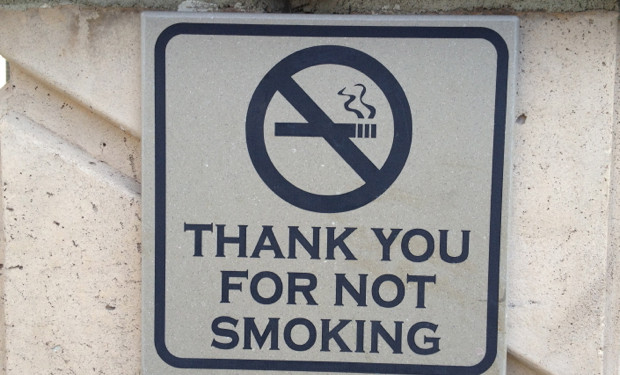Orange County Public Smoking Ban to Take Effect in 2013
On November 21, Orange County Commissioners voted 6-1 to ban smoking in most public places. Prior to the vote, the commissioners were presented with two gallon jars that contained more than 6,000 cigarette butts collected on Franklin Street in 2010. Commissioner Earl McKee cast the only vote against the ban because he believes the ordinance is too broad and represents government overreach.
The ban applies to all town or county-owned property, including sidewalks and parks, and also prohibits smoking on private property that is open to the public. Smoking will be allowed in private residences and vehicles, along with certain private clubs, tobacco shops, and some lodging accommodations. State-owned facilities, including the University of North Carolina at Chapel Hill, will continue to operate under their existing smoking regulations.
Although the ban will take effect on January 1, 2013, it will not be enforced until July 1, 2013. For the first six months, officials will remove public ashtrays, post signs, and educate the public. The focus of the law is education rather than punishment, and violators will be issued a $25 fine.
“This is not intended in any way as a punitive rule,” said Orange County Board of Health member Corey Davis. “There’s overwhelming evidence that decreasing smoking rates and secondhand smoke benefits health, and we just see this rule as another tool for us to do that.”
The ultimate goals of the ordinance include reducing the effects of secondhand smoke, discouraging people from smoking, and reducing cigarette butt litter. According to Orange County Health Department spokeswoman Stacy Shelp, secondhand smoke exposure increases rates of asthma attacks, heart disease, and cancer. Shelp also noted, “We know rules like this help people quit, it motivates them to quit smoking, but it helps youths not start.”
The ban is nearly identical to an ordinance that went into effect on August 1, 2012, in Durham County, which is complaint-driven. Although the Durham County Health Department has received daily calls reporting public smoking, no fines have been issued as the County instead sends a team of educators into the community to raise awareness of smoking cessation programs.
Orange County Commissioner Steve Yuhasz is hopeful that citizens will obey the ordinance. “There are a wide range of places where people have smoke imposed on them against their will,” Yuhasz said. “The purpose of this rule is to minimize those kinds of activities, to protect people who don’t want to smoke and who don’t want to smoke other people’s smoke.”
Enforcement Issues
On December 10, the Hillsborough Town Board expressed concern over whether the county ordinance can be enforced within the town. The county ban goes beyond the Hillsborough smoking laws already in place, notably outlawing outdoor cigarette use in public right-of-ways and on sidewalks controlled, maintained, or owned by the town. Hillsborough Mayor Tom Stevens supports the health issues behind the ban, but is concerned with possible unintended consequences.
Although the Orange County Health Department claims the ordinance is enforceable within the corporate limits of towns within the county, Hillsborough town attorney Bob Hornik said there remains a question whether the ordinance is enforceable without town boards adopting resolutions accepting the ban. Another uncertainty involves whether the Orange County Sheriff’s Office or town police departments will enforce the ban.
Past Smoking Ban Challenges
In early November, the United States Court of Appeals for the Eighth Circuit rejected a constitutional challenge to an outdoor smoking ban in Clayton, Missouri. The court held that the city had a rational basis to restrict smoking in parks, and that smoking is not a fundamental right. This ruling affirmed an earlier decision by the District Court.
The Clayton Board of Aldermen enacted an ordinance prohibiting smoking “in or on any property or premises owned or leased for use by the City of Clayton, including buildings, grounds, parks, [and] playgrounds.” Clayton resident Arthur Gallagher challenged the ordinance as a civil rights violation under the Missouri Constitution and the United States Constitution. He asked the courts to recognize smoking as a fundamental right and claimed the ordinance would fail under rational basis review “because the health threat of secondhand smoke from outdoor tobacco use is de minimis.” Gallagher also argued that the ordinance unfairly targeted smokers but failed to address other sources of air pollution, such as exhaust from nearby vehicles.
“We need not determine whether outdoor secondhand smoke exposure actually causes harm. Because the City reasonably could believe this to be true, the Ordinance survives,” Judge Riley wrote. “The alleged right to smoke in public is not so deeply rooted in the Nation’s history and tradition, and it is not implicit in the concept of ordered liberty.”

